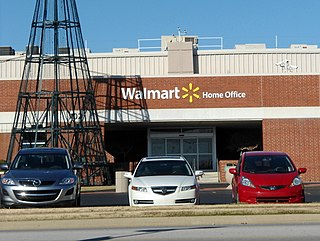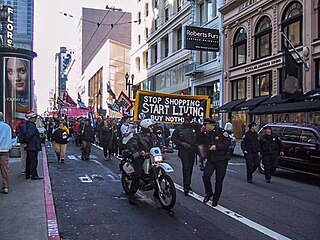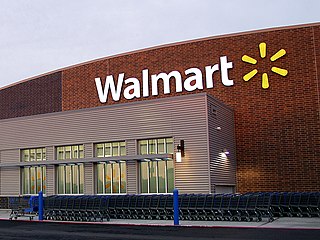
Walmart Inc. is an American multinational retail corporation that operates a chain of hypermarkets, discount department stores, and grocery stores from the United States, headquartered in Bentonville, Arkansas. The company was founded by Sam Walton in nearby Rogers, Arkansas in 1962 and incorporated under Delaware General Corporation Law on October 31, 1969. It also owns and operates Sam's Club retail warehouses. As of April 30, 2021, Walmart has 10,526 stores and clubs in 24 countries, operating under 48 different names. The company operates under the name Walmart in the United States and Canada, as Walmart de México y Centroamérica in Mexico and Central America, and as Flipkart Wholesale in India. It has wholly owned operations in Chile, Canada, and South Africa. Since August 2018, Walmart holds only a minority stake in Walmart Brasil, which was renamed Grupo Big in August 2019, with 20 percent of the company's shares, and private equity firm Advent International holding 80 percent ownership of the company.

A supermarket is a self-service shop offering a wide variety of food, beverages and household products, organized into sections. It is larger and has a wider selection than earlier grocery stores, but is smaller and more limited in the range of merchandise than a hypermarket or big-box market.

Buy Nothing Day is an international day of protest against consumerism. In North America, the United Kingdom, Finland, and Sweden, Buy Nothing Day is held the day after U.S. Thanksgiving, concurrent to Black Friday; elsewhere, it is held the following day, which is the last Saturday in November. Buy Nothing Day was founded in Vancouver by artist Ted Dave and subsequently promoted by Adbusters based in Canada.

Asda Stores Ltd. is a British supermarket chain. It is headquartered in Leeds, England. The company was founded in 1949 when the Asquith family merged their retail business with the Associated Dairies company of Yorkshire. It expanded into Southern England during the 1970s and 1980s, and acquired Allied Carpets, 61 large Gateway Supermarkets and other businesses, such as MFI Group. It sold these acquisitions during the 1990s to concentrate on the supermarkets. It was listed on the London Stock Exchange until 1999 when it was acquired by Walmart for £6.7 billion. Asda was the second-largest supermarket chain in the United Kingdom between 2003 and 2014 by market share, at which point it fell into third place.

A grocery store, grocer or grocery shop (UK), is a store primarily engaged in retailing a general range of food products, which may be fresh or packaged. In everyday U.S. usage, however, "grocery store" is a synonym for supermarket, and is not used to refer to other types of stores that sell groceries. In the UK, shops that sell food are distinguished as grocers or grocery shops, though in everyday use, people usually use either the term "supermarket" or, for a smaller type of store that sells groceries, a "corner shop" or "convenience shop".

A hypermarket is a big-box store combining a supermarket and a department store. The result is an expansive retail facility carrying a wide range of products under one roof, including full grocery lines and general merchandise. In theory, hypermarkets allow customers to satisfy all their routine shopping needs in one trip. The term hypermarket was coined in 1968 by French trade expert Jacques Pictet.
Sam's West, Inc. is an American chain of membership-only retail warehouse clubs owned and operated by Walmart Inc., founded in 1983 and named after Walmart founder Sam Walton. As of January 31, 2019, Sam's Club ranks second in sales volume among warehouse clubs with $57.839 billion in sales behind rival Costco Wholesale.
A discount store or discounter is a term that has been used over time and across different countries for a number of different retail formats, all of which sell products at prices that are in principle lower than an actual or supposed "full retail price".

The American multinational retail chain Walmart has been criticized by many groups and individuals, such as labor unions and small-town advocates, for its policies and business practices, and their effects. Criticisms include charges of racial and gender discrimination, foreign product sourcing, anti-competitive practices, treatment of product suppliers, environmental practices, the use of public subsidies, and its surveillance of its employees. The company has denied any wrongdoing and said that low prices are the result of efficiency.
Consumers Distributing was a catalogue store in Canada and the United States that operated from 1957 to 1996. At its peak, the company operated 243 outlets in Canada and 217 in the United States, including stores in every province in Canada and in the states of New Hampshire, Massachusetts, Connecticut, New York, New Jersey, Pennsylvania, Maryland, California and Nevada.
Real Canadian Superstore is a chain of supermarkets owned by Canadian food retailing giant Loblaw Companies. Its name is often shortened to Superstore, or, less commonly, RCSS.

A big-box store is a physically large retail establishment, usually part of a chain of stores. The term sometimes also refers, by extension, to the company that operates the store.
Hypermart USA was a demonstrator project operated by Walmart in the 1980s and 1990s, which attempted to combine groceries and general merchandise under one roof at a substantial discount. The hypermart concept was modeled after earlier efforts from other retailers, notably French retailers such as Auchan and Carrefour, and the Midwestern big retailer Meijer.
Walmarting is a neologism referring to U.S. discount department store Walmart with three meanings. The first use is similar to the concept of globalization and is used pejoratively by critics and neutrally by businesses seeking to emulate Walmart's success. The second, pejorative, use refers to the homogenization of the retail sector because of those practices. The third, neutral use refers to the act of actually shopping at Walmart.
Shopping cart software is a piece of e-commerce software on a web server that allows visitors to have an Internet site to select items for eventual purchase.
Walmart Canada is the Canadian subsidiary of Walmart which is headquartered in Mississauga, Ontario. It was founded on March 17, 1994, with the purchase of the Woolco Canada chain from the F. W. Woolworth Company.
Dominick's was a Chicago-area grocery store chain and subsidiary of Safeway Inc.. Dominick's distribution center was located in Northlake, Illinois, while its management offices were located in Oak Brook, Illinois.

The history of Walmart, an American discount department store chain, began in 1950 when businessman Sam Walton purchased a store from Luther E. Harrison in Bentonville, Arkansas, and opened Walton's 5 & 10. The Walmart chain proper was founded in 1962 with a single store in Bentonville, expanding outside Arkansas by 1968 and throughout the rest of the Southern United States by the 1980s, ultimately operating a store in every state of the United States, plus its first stores in Canada, by 1995. The expansion was largely fueled by new store construction, although the chains Mohr-Value and Kuhn's Big K were also acquired. The company introduced its warehouse club chain Sam's Club in 1983 and its first Supercenter stores in 1988. By the second decade of the 21st century, the chain had grown to over 11,000 stores in 27 countries.

Omni Superstore was a chain of supermarkets in the Chicago area and was owned by Dominick's. In 1997, Dominick's phased out Omni and converted the stores into Dominick's because the concept was not generating enough revenue compared to other Dominick's stores.









